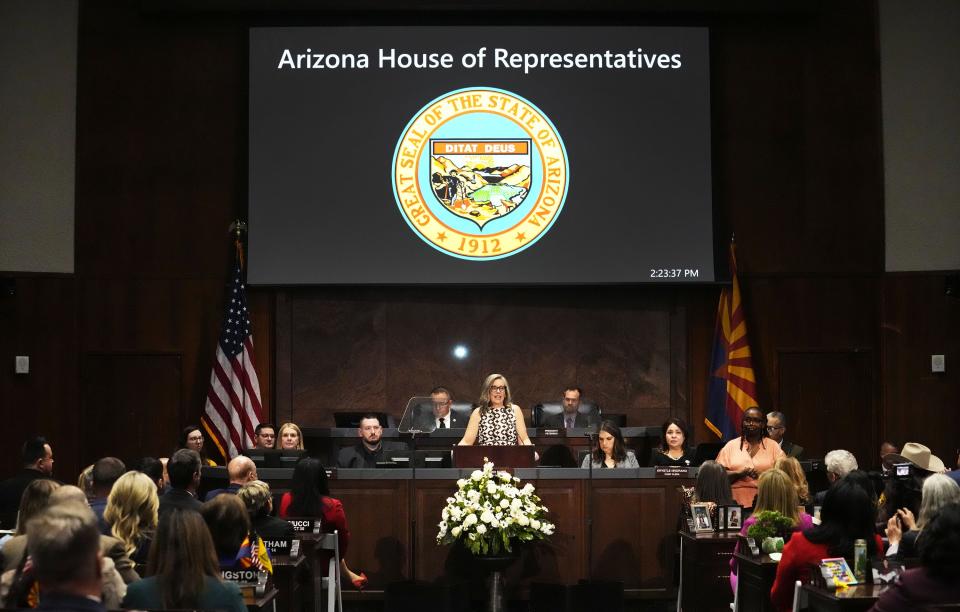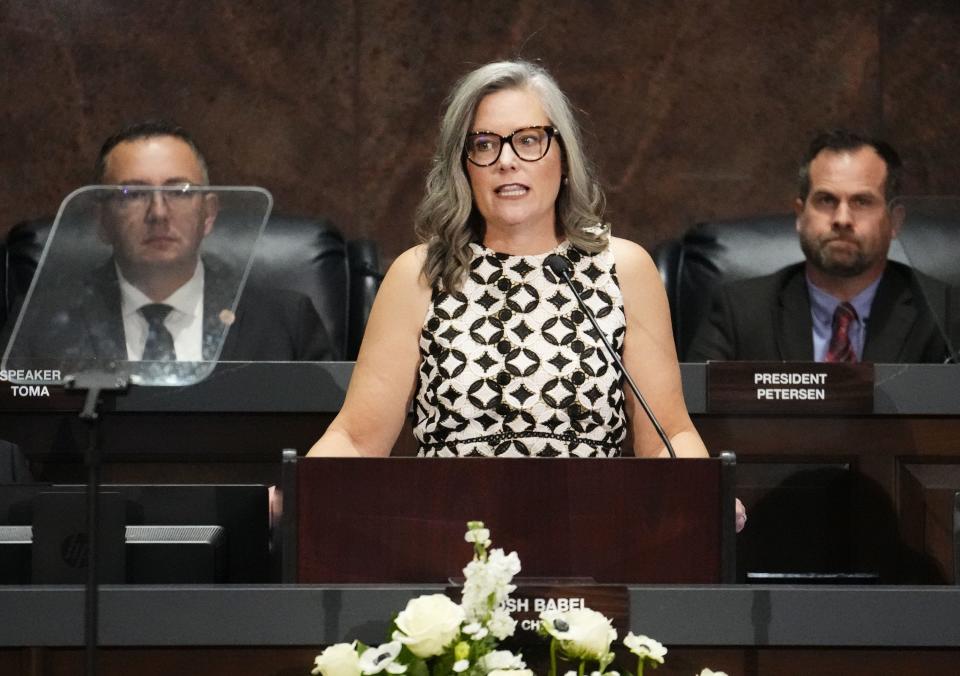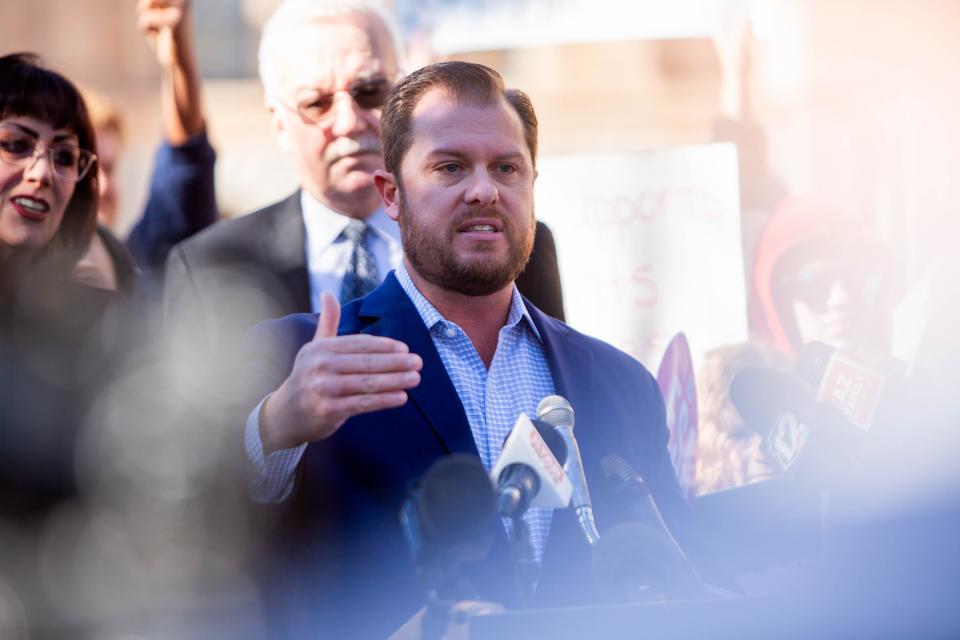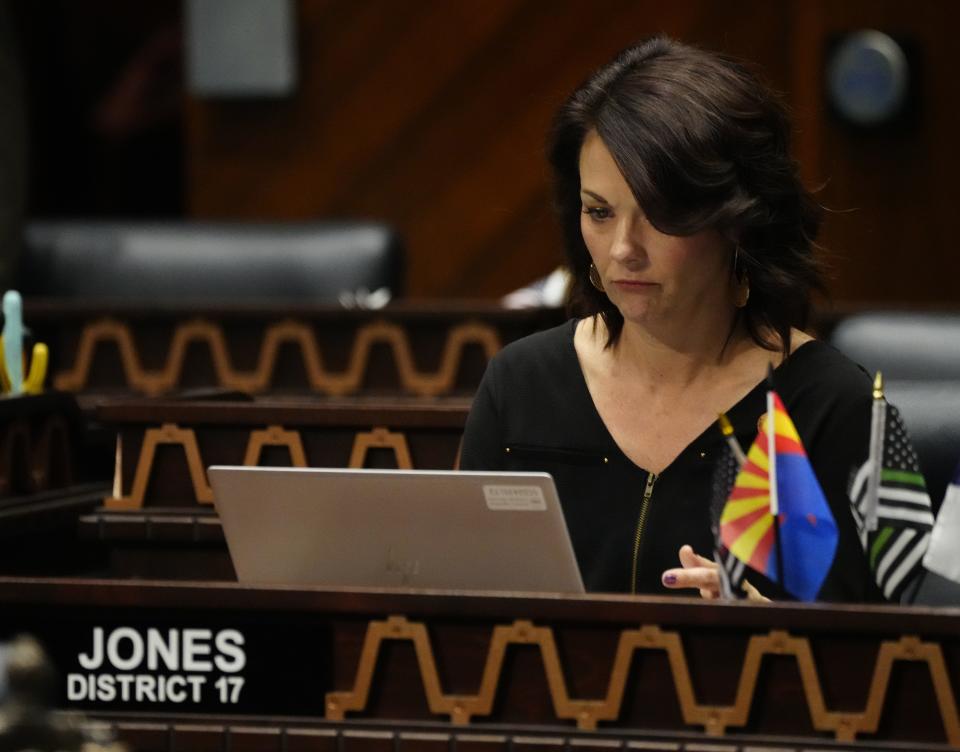A shorter leash: Lawmakers push for shorter terms for Arizona’s government agencies
- Oops!Something went wrong.Please try again later.
Nearly three dozen state agencies face uncertain futures, with consequences for the citizens they serve.
But unlike previous years, where lawmakers typically extended an agency's lifeline for eight to 10 years, this year lawmakers want a tighter leash.
The road ahead for the Department of Transportation could be four years. Or maybe six. The Department of Homeland Security should get a two-year extension, a Senate committee recommended. But its House counterpart couldn't pin down a number, although members concluded the agency should not be "sunsetted," or recommended for termination.
As for the Arizona Resource Advisory Council, which advises the federal Bureau of Land Management on the use of the 2.1 million acres of BLM land in Arizona? It should die as of July, yet another legislative review panel said.
These and other recommendations will be debated in the coming months as part of the Legislature's duty to periodically review agency performance. Without a continuation, no matter how short, an agency will cease to operate as of July.

It's not like it used to be
The proposed shorter terms are an abrupt departure from past practice. Critics see partisanship in the shift as the Republican-controlled Legislature copes with the first Democratic governor in 14 years.
But lawmakers say they're simply doing their job, shining a light on bureaucratic machinations that don't always serve the public and demanding improvement.
Count Sen. Priya Sundareshan among the skeptics who see the sudden change in practice as a response to divided government. She, like lawmakers of both parties, supports scrutiny of state agencies. But she said this round of proposals is too stringent.
“We are essentially weaponizing the audit process as a way to go after state agencies," Sundareshan, D-Tucson said as she voted against a proposal to "revise and consolidate" the duties of the Arizona Commerce Authority, the state's economic development arm.
Gov. Katie Hobbs appoints the agency directors, and they report to her. To Sundareshan, the audit process is this year's version of the Senate's director nomination committee, which heavily scrutinized Hobbs' appointees before the whole process dissolved into a legal dispute now in court.

Scrutiny is the Legislature's duty
Lawmakers, primarily Republican members, defend the shorter timelines as a way to ensure agencies do their job.
"We believe in responsible government, we believe in effective government," Sen. Jake Hoffman, R-Queen Creek said. The Senate Government Committee, which he chairs, recommended two-year terms for the nine boards, committees and agencies it reviewed as a way to set a starting point for future negotiations. For two other entities, the committee recommended revisions to their mission or consolidations.
Hoffman said the two years will buy time for the Office of the Auditor General to do the detailed performance audits required by law.
The founder of the Legislature's Freedom Caucus, Hoffman acknowledged the terms will likely be longer after the full Legislature debates, noting House panels were going for "very long continuations."

Extensions vary from none to 10
Not all agencies received shortened extensions.
The Arizona and Prescott historical societies were recommended for eight-year continuations. The Cotton Research Council and the Arizona Power Authority, which manages water distributions from Hoover Dam, also got eight years.
But many others landed in the two- to four-year range after public hearings. That includes Hobbs' Office of Tribal Relations, which received a four-year recommendation from a House panel and two years from the Senate.
"I think four-year continuations for any state agency are a waste of resources," Hobbs said after the House vote, noting the process includes an audit and multiple legislative hearings. "That wasn't really how the system was set up to be. Legislators use these to carry out their political agendas, and it just interferes with government continuation."
Critics question how an agency can operate well if it's under constant audit. Besides, the Office of the Auditor General is short-staffed, Sen. Juan Mendez, D-Tempe noted.
A full performance audit takes 20 months, according to legislative guidelines. Multiply that by nearly three dozen agencies and the task would seem impossible, he suggested.
Yuma County Sheriff Leon Wilmot drove to Phoenix to promote the state Department of Homeland Security, calling it indispensable for his office's work on border safety.
He urged the Senate Government panel to continue the agency "for as long as possible."
In a later interview, Wilmot said the two-year extension recommended by the committee seems fruitless given concerns about the auditor general's ability to handle dozens of audits in a two-year timeframe.
“The reality is it’s not going to happen in two years," Wilmot said of the formal, deep dive review done by the auditor general. Plus, he added, his office, as well as the Homeland Security Department, are audited annually by the federal government, due to federal grant oversight.

Sen. Ken Bennett's Education Committee gave 10-year extensions to the agencies it had to review: The state Board for Charter Schools and the Arizona Commission for Post-Secondary Education.
Bennett, R-Prescott, said there was no directive to push for shorter terms, although after his committee's vote, Senate President Warren Petersen asked him to consider eight years instead of 10. Bennett said he was OK with eight years, but nothing less.
Bennett attributed the shorter terms to "individual members who don’t like stuff happening at agencies, or don’t like agencies themselves.”
Other ways to control agencies
A former Senate president, Bennett doubts the auditor general has sufficient staff to do its deep-dive audits every two or four years.
“The best way to keep tabs on an agency is through its annual budget,” he said. If something starts to go awry, lawmakers can put conditions on how its money is spent, he said. If problems persist, lawmakers can dig into individual programs and assert more control.
“You don’t threaten them with terminating," Bennett said.
Rep. Matt Gress, R-Phoenix, made a similar observation as a House panel pushed for a four-year continuation for the state Department of Child Safety. Several lawmakers backed a suggestion from Rep. Rachel Jones, R-Tucson, to limit the child welfare agency to two years.

A full-blown audit is not the only tool lawmakers have, Gress said. A better solution is to put stricter controls on the budget and to bring in agency officials to testify before lawmakers.
Sundareshan sees this year's debates as an echo of the arguments over the Arizona Schools for the Deaf and Blind. The agency had received a fairly clean report from the auditor general, and early recommendations were for an eight-year renewal.
But Hoffman intervened, pushing for a shorter timeline in the name of ensuring better educational performance. That set off a series of contentious and high-profile hearings attended by former students and advocates for deaf and blind children. In the end, lawmakers approved a four-year extension.
This year, Senate Democrats introduced a bill to give the school a 10-year extension, although it has yet to be assigned to a committee.
Gil Orrantia and Tim Roemer, two former directors of the Department of Homeland Security, defended the agency they ran under two Republican governors.
“Now is not the time to dismantle and sunset this agency,” Orrantia told a House panel. He cited cyber security concerns as one of the key reasons to keep the agency up and running.
Reporter Stacey Barchenger contributed to this story.
Reach the reporter at maryjo.pitzl@arizonarepublic.com or at 602-228-7566 and follow her on Threads as well as on X, the platform formerly known as Twitter @maryjpitzl.
Support local journalism. Subscribe to azcentral.com today.
This article originally appeared on Arizona Republic: Lawmakers push for shorter terms for Arizona’s government agencies

